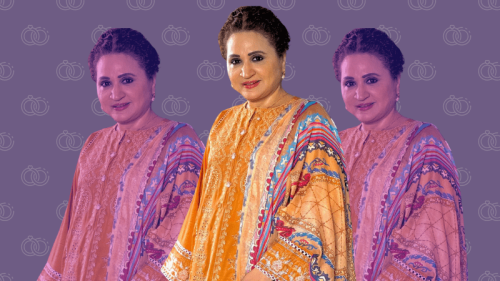The context The veteran actor Asma Abbas recently shared some hot takes about marriage, particularly the age at which a woman should marry. She uploaded the video to her YouTube channel. She asserts that a woman has excessive self-confidence and opinions once she reaches the age of 30 and that there is an age limit for marriage.
She said that these women are used to living their lives in a certain way, don’t understand things well, think they are right, and may disagree. I’m not sure who would disagree with me, but I think bossy husbands and mothers-in-law are a safe bet.
You can work once you’re married if you get married on time. If you don’t, you’ll get older and have cats and dogs as children because women want to be mothers. Women are naturally mothers, but people who don’t have children adopt pets and call them “babies.”
The expiration date for women Let’s begin at the beginning. A woman, whether she is married or not, is a complete individual on her own, and a man does not complete her. She is not a 30-year-old commodity; rather, she is an individual who is her own person.
The notion that a woman over 30 is too “opinionated” and “confident” demonstrates that people like Abbas want to be subservient blobs of clay that they can mold to their liking. a sanskari bahu who not only acts as her in-laws want her to, but also thinks as they want her to and holds the views they want her to have.
Most women are still young and haven’t had a chance to fully experience the world or form their own strong opinions. They may have a harder time determining whether what is being asked of them is reasonable due to their lack of life experience. Because of this, they are excellent candidates to be subservient to another individual. They frequently jump when their husband or mother-in-law tells them to. They stay obedient because of this dynamic, which makes it easy for those who prefer obedience to partnership.
This does not imply that all women under the age of 30 lack opinion or spine, but rather that they may not yet possess a sense of self that enables them to resist unreasonable demands or stand their ground. They have had fewer opportunities to experience and have learned fewer lessons as they have gotten older.
To put it simply, I believe Abbas wants to make life simpler for herself or other mothers-in-law by following this directive. A younger bahu is more likely to listen rather than speak.
Abbas is also trivializing the experiences and opinions of women under the age of 30 with her statement, which is a double entendre. It suggests, in a way, that young women’s perspectives are of little importance, as if wisdom and maturity are only available to those over a certain age. Although it is true that maturity comes with age, she is inadvertently dismissing the opinions of young women and reinforcing the false belief that their beliefs are invalid due to their youth.
Keep in mind that Malala Yousafzai won the Nobel Peace Prize when she was just 17 years old. She wasn’t thirty. She had no husband. Be that as it may, she was a promoter for harmony and ladies’ more right than wrong to schooling. Greta Thunberg, a 21-year-old Swedish activist, is simultaneously a global figurehead for environmental justice. Bisan Owda, a 27-year-old Palestinian journalist, is simultaneously a prophet of truth in the face of extreme injustice and brutality. They are important. The opinions of all women, regardless of age, are important. Regardless of their age, the thoughts of powerful, strong-willed women would make the world a bleak place.
Even worse, men over 30 are not labeled as having an excessive amount of confidence or opinions. In Pakistani society, women over a certain age are frequently criticized for being too assertive and self-assured, but men are never mentioned in the same light. This gendered power imbalance in society is reflected in Abbas’s statement: men are expected to be opinionated and self-assured, whereas women only reach that level with experience and maturity. It could be argued that this is the case in countries in South Asia because men are taught to be decisive and unreserved, traits that make them more masculine, and women are taught to be meek and submissive, the “perfect” yin to a confident man’s yang.
Pakistani women are unfortunate in that as they grow older and gain life experience, they gradually learn that self-assurance and conviction are options as well. Regardless of their age, trying to marry them off before they realize this is an attempt to take away their confidence.
Even after marriage, life isn’t that great, especially for Pakistani women. Domestic violence affects 90% of Pakistani women, according to the Pakistan Human Rights Commission. Emotional and physical violence against women by partners was found to be 36.4 percent and 18.4 percent, respectively, according to another study.
Getting a woman married when she is older and more self-assured might help her recognize harmful patterns and leave an abusive relationship. It’s possible that a younger woman who grows her frontal cortex in the presence of an abusive partner will be more receptive to her circumstances. For every year that a couple waits to wed until they are 24 years old, a cross-national study that was carried out in 48 countries with lower and middle incomes found that intimate partner violence (IPV) decreased.



